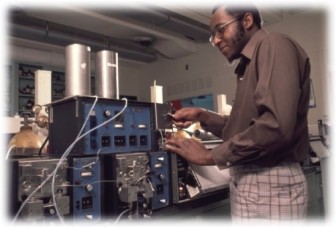Parker High School, Family And Community Helped Propel Top Scientist Dr. Willie May
College graduation is just days away for millions of students. A recent study shows there’s good news for grads looking for jobs in science, technology, engineering and math, also known as STEM fields. Dr. Willie May, a graduate of Birmingham’s Parker High School, struck out on a path in science more than 45 years ago, completing a chemistry degree at Knoxville College. Today, he’s one of nation’s chief scientists and heads the National Institute for Standards and Technology. Dr. May talks with WBHM’s Sherrel Wheeler Stewart about his work, how he got there and what science offers our nation’s youth.
What benefit does an education in science or technology offer graduates today?
“There are so many opportunities that you have as a scientist that you don’t have if you work in some other field. Scientists by our nature share our research results with the global community. The training you get as a scientist of assimilating information from diverse sources and making decisions, I think, prepare you for leadership positions in other areas.”
What sparked your interest in science?
“My mother had decided that I would go to college and the only way I could do that was to get a scholarship. My dad wanted me to play baseball. Back in those days in Birmingham, the big plants had teams – TCI, Conner Steel, Stockholm. If you played ball, you didn’t have to work very hard. Science intimidated folks, like it still does. This was the post Sputnik era. So if you had an aptitude for science, and pursued that, there was a great chance that you’d get a scholarship. My ambition was wearing a white lab coat and working in it, and not working in the steel mills and coal mines. So that was my vision for success.”
How do we attract youths today to the study of science and technology?
“I think we have to continually articulate the importance of science and technology to our well being as a society. I think we have to get kids to see that [science] it can be cool and exciting.”
Did you face barriers growing up in Birmingham in the 50s and 60s?
“Obviously growing up in Birmingham Alabama in the late 50s and 60s there were barriers, but fortunately I had lots of folks who invested a lot in me and I owed it to them not to allow those barriers to deter me.”
Can you tell us about the National Institute for Standards and Technology?
“We are doing science in any area of measurements in science that you could imagine. In 1901, we were developing the standards for light, light bulbs. Fast forward to 2016, we are researching advanced communication. We’re working with the buildout of of a nationwide LTE network for first responders. Every day has offered new challenges and an opportunity to see how my work and the work of the institution is making an impact on innovation, productivity and improve the quality of life not only in the U.S. but around the world.”
“There has not been one day in 45 years that I got up and said, “Dog, I got to get up and go to work today.”
Homeland Security suspends TSA PreCheck and Global Entry airport security programs
The U.S. Department of Homeland Security is suspending the TSA PreCheck and Global Entry airport security programs as a partial government shutdown continues.
FCC calls for more ‘patriotic, pro-America’ programming in runup to 250th anniversary
The "Pledge America Campaign" urges broadcasters to focus on programming that highlights "the historic accomplishments of this great nation from our founding through the Trump Administration today."
NASA’s Artemis II lunar mission may not launch in March after all
NASA says an "interrupted flow" of helium to the rocket system could require a rollback to the Vehicle Assembly Building. If it happens, NASA says the launch to the moon would be delayed until April.
Mississippi health system shuts down clinics statewide after ransomware attack
The attack was launched on Thursday and prompted hospital officials to close all of its 35 clinics across the state.
Blizzard conditions and high winds forecast for NYC, East coast
The winter storm is expected to bring blizzard conditions and possibly up to 2 feet of snow in New York City.
Norway’s Johannes Klæbo is new Winter Olympics king
Johannes Klaebo won all six cross-country skiing events at this year's Winter Olympics, the surpassing Eric Heiden's five golds in 1980.







